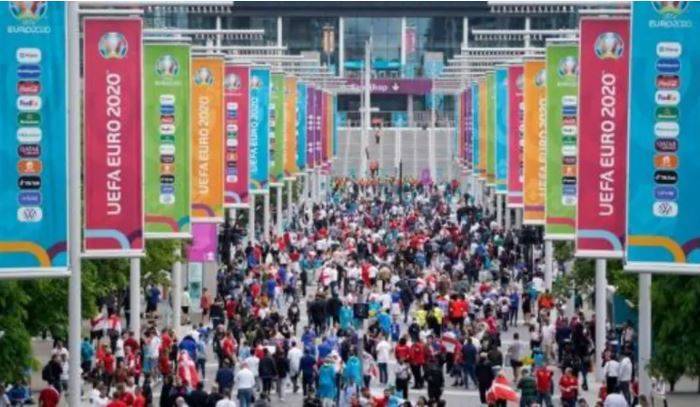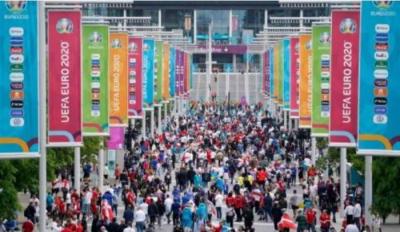The spread of the highly infectious Delta variant of the coronavirus raises fears that celebrations associated with the Euro 2020 football final on Sunday evening in England could lead to further outbreaks. England and Italy will face off at 8:00 PM London time in front of 65,000 spectators at Wembley Stadium, which will host attendees at 75% of its capacity on this historic day, marking England’s first final appearance since 1966.
It is not the stadium itself that worries experts, but rather the gatherings, especially indoors, that will occur due to this important match, particularly in the United Kingdom, where most restrictions have been lifted, and daily infections reached 30,000 last week. The spread of the new variant poses risks to global economic prospects, as warned by finance ministers from the Group of Twenty (G20) on Saturday, while vaccination rates vary significantly from one country to another, along with the lifting or enforcement of restrictions.
The Delta variant, which first emerged in India, is causing the most concern due to its rapid spread, resulting in outbreaks in Asia and Africa, with rising infections also in Europe and the United States. The G20’s final statement on Saturday warned of a "series of risks" weighing on the recovery of the global economy due to "the spread of new COVID-19 variants and varying vaccination rates."
While the global economic situation "has improved, especially due to increased vaccination efforts" in recent months, the G20 noted in its closing statement that the crisis is not over yet. The leaders of the world’s twenty richest countries called for speeding up the vaccination process, committing to do more to support developing countries in this area.
The United Nations Secretary-General António Guterres emphasized that 70% of the populations in some developed countries have been vaccinated, while the rate is below 1% in low-income countries. European Commission President Ursula von der Leyen stated on Saturday that the European Union has achieved its goal of having enough COVID-19 vaccines to inoculate 70% of the adult population, adding that "by tomorrow (Sunday), we will have distributed about 500 million doses across Europe."
She continued, noting that COVID-19 "has not yet been defeated, but we are ready to continue providing vaccines, including against new variants," stressing that "member states must now do everything possible to ensure vaccination progress. Only then will we all be safe." However, other regions in the world are facing significant challenges. Bangladesh has secured agreements for an additional 17.5 million doses of COVID-19 vaccines, according to the health ministry on Saturday, as the country of 169 million grapples with record death tolls, and infections exceeded one million. The residents of this country are under what is considered the strictest lockdown since the pandemic began, with the army patrolling the streets to enforce compliance.
Several countries, including Spain, the Netherlands, and Thailand, have decided to reintroduce health restrictions. French President Emmanuel Macron is expected to announce new restrictions on Monday in response to the spread of the Delta variant, while Argentina has extended its current measures until early August. Beginning Wednesday, Malta will close its borders to unvaccinated travelers, becoming the first European country to take this step.
In Japan, with the Olympic Games approaching, the number of events available for public attendance is shrinking. The Hokkaido and Fukushima regions in the north of the country have decided to prohibit spectators at stadiums during the Olympic football, baseball, and softball events, which will take place from July 23 to August 8. This stance contradicts the Japanese authorities who announced that competitions would be held behind closed doors in the capital and surrounding regions, but the public could attend events taking place farther from the capital.
South Korea, which has long been considered a model in managing the pandemic, recorded 1,378 new infections, a record number for the third consecutive day, as the capital Seoul prepares to implement some of the strictest measures since the start of the health crisis. Russia reported a record daily death toll of 752 cases on Saturday, bringing the total to five since the beginning of this month, along with 25,802 new cases.
According to a count by AFP based on official sources, the coronavirus has caused the deaths of 4,013,756 people worldwide since the World Health Organization's office in China reported the emergence of the disease at the end of December 2019. More than 185,508,430 people have confirmed cases of the virus since its emergence.




